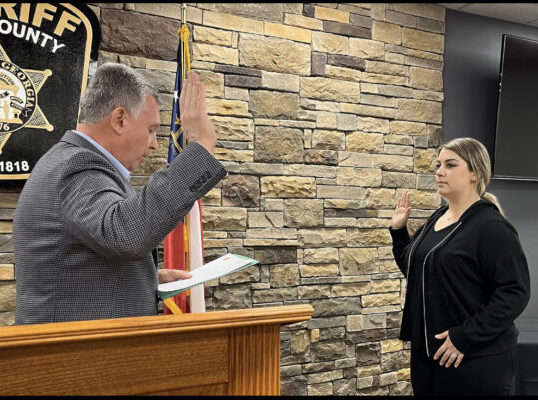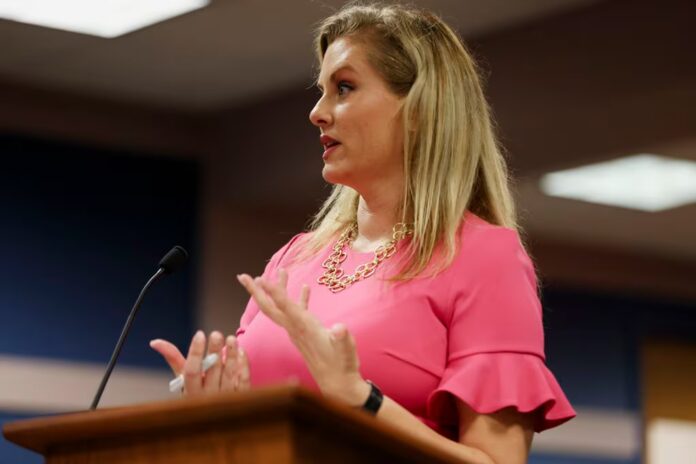WASHINGTON (States Newsroom)—U.S. House lawmakers cast a broadly bipartisan vote Wednesday to approve a six-bill government funding package, marking one of the few consequential votes on major legislation the chamber has taken since Republicans took the majority more than a year ago.
The $468 billion package includes half of the annual spending bills for the fiscal year that began back on Oct. 1. Lawmakers hope to wrap up agreement on the other six before a March 22 deadline so as to avert a partial shutdown.
The 1,050-page package, which was approved 339-85, now goes to the Senate, where lawmakers are expected to vote on it before the end of the week. President Joe Biden is then expected to sign it into law.
The four Democrats in Georgia’s delegation were joined by Republican Reps. Buddy Carter of Pooler, Drew Ferguson of The Rock, and Austin Scott of Tifton in voting for the package.
‘Most conservative bills in history’
House Appropriations Chairwoman Kay Granger, a Texas Republican, encouraged lawmakers to support the measure, saying it “increased defense funding and made targeted cuts” to other programs.
“With the odds stacked against us, House Republicans made progress in how we fund the government,” Granger said. “We drafted the most conservative bills in history.”
House Appropriations Committee ranking member Rosa DeLauro, a Connecticut Democrat, said she was “pleased” that Democrats and Republicans in both chambers of Congress were able to negotiate a final agreement on the six bills.
“This legislation does not have everything either side may have wanted, but I am pleased that many of the extreme cuts and policies proposed by House Republicans were excluded,” DeLauro said.
Texas Republican Rep. Chip Roy spoke against the package, saying it spends too much money and doesn’t include enough changes to policy that conservatives pressed for in the House’s original spending bills.
“All of this is a shell game,” Roy said.
Money for agencies, earmarks
The spending package includes funding for the departments of Agriculture, Commerce, Energy, Housing and Urban Development, Interior, Justice, Transportation and Veterans Affairs.
It also provides funding for numerous agencies, like the Army Corps of Engineers, Environmental Protection Agency, Food and Drug Administration, National Aeronautics and Space Administration or NASA, National Science Foundation, and military construction projects.
According to two people familiar with the totals, the package includes $12.655 billion for more than 6,600 projects that members requested through the earmarking process, which is often called community project funding or congressionally directed spending.
The six bills include discretionary spending, which Congress approves annually and can fluctuate, as well as some mandatory spending, which is required by laws that Congress has approved.
Discretionary accounts, which make up about one-third of federal spending each year, are subject to the spending caps agreement that House Speaker Mike Johnson, a Louisiana Republican, and Biden agreed to in January.
That compromise set defense discretionary funding at $886.3 billion and domestic discretionary spending at $772.7 billion.
WIC gets a $1 billion boost
The Agriculture-FDA spending bill would provide $211 billion in total spending, with $26.2 billion of that classified as discretionary.
The legislation would boost spending on the Special Supplemental Nutrition Program for Women, Infants, and Children, known as WIC, by $1 billion, bringing the total mandatory spending on that program to more than $7 billion. That increase was needed to avoid states having to establish waitlists for the program.
The bill would add the U.S. Secretary of Agriculture to the Committee on Foreign Investment in the United States and provide $2 million in funding to ensure the secretary can notify the CFIUS when agricultural land is sold to entities that “may pose a risk to national security.”
The bill specifically mentions purchases by China, Iran, North Korea, and Russia.
Georgia Democratic Rep. Sanford Bishop of Albany, ranking member on the Agriculture-FDA spending panel, said during floor debate the elements in the bill will affect “the lives of every single American” whether they live in a rural, suburban or urban area.
“The bill is free from almost all of the extreme policy riders in the previous versions and it rejects interference with Americans’ health care, reproductive freedom, as well as attacks on diversity, equity and inclusion training,” Bishop said.
“While the bill is not the best,” Bishop said, “it brings us closer than the earlier version to meeting the needs of the American people.”
Reversing ‘Second Amendment overreach’
The Commerce-Justice-Science appropriations bill totals $68.5 billion in discretionary spending, with $37.5 billion going to the DOJ, $24.9 billion for NASA, $10.8 billion for the Commerce Department, and $9.1 billion for the National Science Foundation.
Those spending levels are all decreased from current funding levels. The Federal Bureau of Investigation would need to account for a $32 million cut to its $10.6 billion salaries and expenses budget, while the Bureau of Alcohol, Tobacco, and Firearms will need to address a $47 million cut to its $1.6 billion salaries and expenses budget.
House Republicans said in their summary of the bill the spending cuts would reverse the ATF’s “Second Amendment overreach” and hold the FBI “accountable for targeting everyday Americans.”
Lawmakers urged the FBI to “allocate the maximum amount of available resources” toward arresting people selling fentanyl and opioids, according to an explanatory statement that accompanied the bill.
Members of Congress received millions in earmarks in the Commerce-Justice-Science bill to address fentanyl in their home states. That directed funding included a $3 million request by Louisiana Republican Rep. Garret Graves for the East Baton Rouge Sheriff’s Office task force on fentanyl and violent crime.
Washington state Democratic Sen. Maria Cantwell secured slightly more than $1 million for the drug and fentanyl task force of the Confederated Tribes and Bands of the Yakama Nation. And Alabama Republican Sen. Tommy Tuberville received $200,000 for the city of Fairhope to address fentanyl.
‘Tough but fair’ talks
Kentucky Republican Rep. Hal Rogers, chairman of the CJS subcommittee, said during floor debate that “tough but fair bipartisan negotiations” led to a “strong bill.”
“The fiscal situation facing the nation requires Congress to make significant spending reductions while maintaining strong commitments to the safety, security and wellbeing of the American people,” Rogers said.
The Energy-Water funding bill would get $52 billion, with that funding divvied up between the Energy Department, the Bureau of Reclamation and the Army Corps of Engineers.
The Energy Department would get $50.2 billion, with nearly $33 billion going to its defense programs, much of which is devoted to nuclear weapons, and $17.3 billion going to its non-defense programs, such as nuclear energy.
The Interior-Environment spending bill would provide $41.2 billion in funding, a cut of $1.5 billion compared to current levels, according to a summary of the bill from House Democrats.
The legislation would reduce funding for the National Park Service by $150 million to a total funding level of $3.3 billion.
Funding for the Bureau of Land Management would be cut by $81 million to $1.38 billion.
Spending on the U.S. Fish and Wildlife Service would drop by $51 million to $1.7 billion.
And appropriations for non-fire activities at the U.S. Forest Service would total $3.8 billion, a reduction of $157 million.
Wildland fire management would receive $6.1 billion in spending for this fiscal year.
Idaho project blocked
Idaho Republican Sen. Mike Simpson, chairman of the Interior-Environment spending panel, said during debate that “cutting funding is never easy but with a national debt in excess of $34 trillion we made tough choices in this bill to rein in spending.”
Simpson touted that the legislation would block the Lava Ridge Wind Project in his home state from advancing until the secretary of the Interior, in consultation with local officials and stakeholders, looks at “alternative plans to reduce the harmful impacts of this project.”
The Military Construction-VA appropriations bill includes nearly $330 billion in total funding, with $172.5 billion going to mandatory accounts and $135.25 billion in discretionary spending.
Military construction would receive $18.7 billion in spending for more than 160 major projects. That money would be divided up between numerous accounts, with $2 billion for housing, $336 million for child development centers and $293 million for the NATO Security Investment Program, among several other line items.
The VA would receive $134.8 billion in discretionary funding for everything from $3.1 billion for veterans’ homelessness prevention to $16.2 billion for mental health to $343 million for rural health.
Women’s health would receive $990 million, efforts to address opioid misuse would get $715 million and prosthetic research would receive $943 million.
Florida Democratic Rep. Debbie Wasserman Schultz, the ranking member on the Military Construction-VA spending panel, said she was “so pleased” to work with others on the committee to “end harmful VA research on dogs, cats, and non-human primates within two years.”
Background checks and veterans
The package would bar the VA from reporting any veterans who receive assistance managing their finances to the Federal Bureau of Investigation’s National Instant Criminal Background Check System without the approval of a judge or magistrate that the veteran “is a danger to himself or herself or others.” The NICS system is supposed to be used to run background checks ahead of gun purchases.
That provision was added to the Senate’s original Military Construction-VA spending bill after Louisiana Republican Sen. John Kennedy and Kansas Republican Sen. Jerry Moran introduced it and senators voted 53-45 in October to adopt it during floor debate.
Montana Democratic Sen. Jon Tester, chairman of the Veterans Affairs Committee and a member of the Military Construction-VA appropriations subcommittee, said at the time he supported the Kennedy-Moran amendment.
“It is not right that a D.C. bureaucrat at the VA could take away veterans’ legal rights to their firearms simply because they need assistance in managing their finances,” Tester said during floor debate in October.
Democratic Sens. Joe Manchin of West Virginia and Jacky Rosen of Nevada voted for the amendment, as did independent Sens. Angus King of Maine and Kyrsten Sinema of Arizona.
The House voted 228-206 in July to adopt a similar amendment, sponsored by House Veterans Committee Chairman Michael Bost, an Illinois Republican, during floor debate on its original version of the bill. That proposal didn’t have the possibility of a judge approving the information to go to NICS.
Democratic Reps. Henry Cuellar of Texas, Jared Golden of Maine, Vicente Gonzalez of Texas, Mary Peltola of Alaska, Marie Perez of Washington state, and Gabe Vasquez of New Mexico voted to adopt the amendment.
California Democratic Rep. Mark Takano, ranking member on the Veterans Affairs Committee, said during floor debate Wednesday that when a “veteran applies for benefits they’ve earned, they are screened to make sure that they are competent to use those benefits” to avoid veterans being taken advantage of.
“If a veteran is determined to be mentally incompetent, they are appointed a fiduciary, and by law, they are reported to the … NICS,” Takano said, adding that those determinations are due to severe mental illnesses like dementia or schizophrenia.
Takano said he could not and would not support the legislation changing that reporting requirement, since 68% of veterans’ suicides involve a firearm and “there are very serious reasons why a person with those conditions should not be able to purchase a firearm.”
“Veterans’ lives are on the line and I will not agree to legislation that will cause more people’s lives to be lost to gun violence,” Takano said.
Added air traffic controllers
The Transportation-HUD funding bill would get about $97.5 billion in discretionary funding with nearly $27 billion for transportation and $70.1 billion for HUD.
Within those funding levels, the Federal Aviation Administration would receive $19.9 billion, which would allow for an “additional 1,800 new air traffic controllers and continues to support modernizing the legacy systems in our National Airspace,” according to a summary of the bill from Senate Republicans.
HUD’s funding would go toward several programs, including $32.4 billion for tenant-based rental assistance, $16 billion for project-based rental assistance, $4.1 billion for homeless assistance grants, and $3.3 billion for Community Development Block Grants.
Oklahoma Republican Rep. Tom Cole, chairman of the Transportation-HUD spending panel, said during debate that lawmakers “worked really hard on safety first” for people flying, traveling by rail, or driving.
The bill, Cole said, also maintains the safety net for people using public housing and includes “historic gains for Indian housing programs and Indian road programs.”
“We all know what has happened with the cost of rent and housing,” Cole said. “And frankly, we didn’t want to put anybody out of their home, and we avoided doing that.”

















